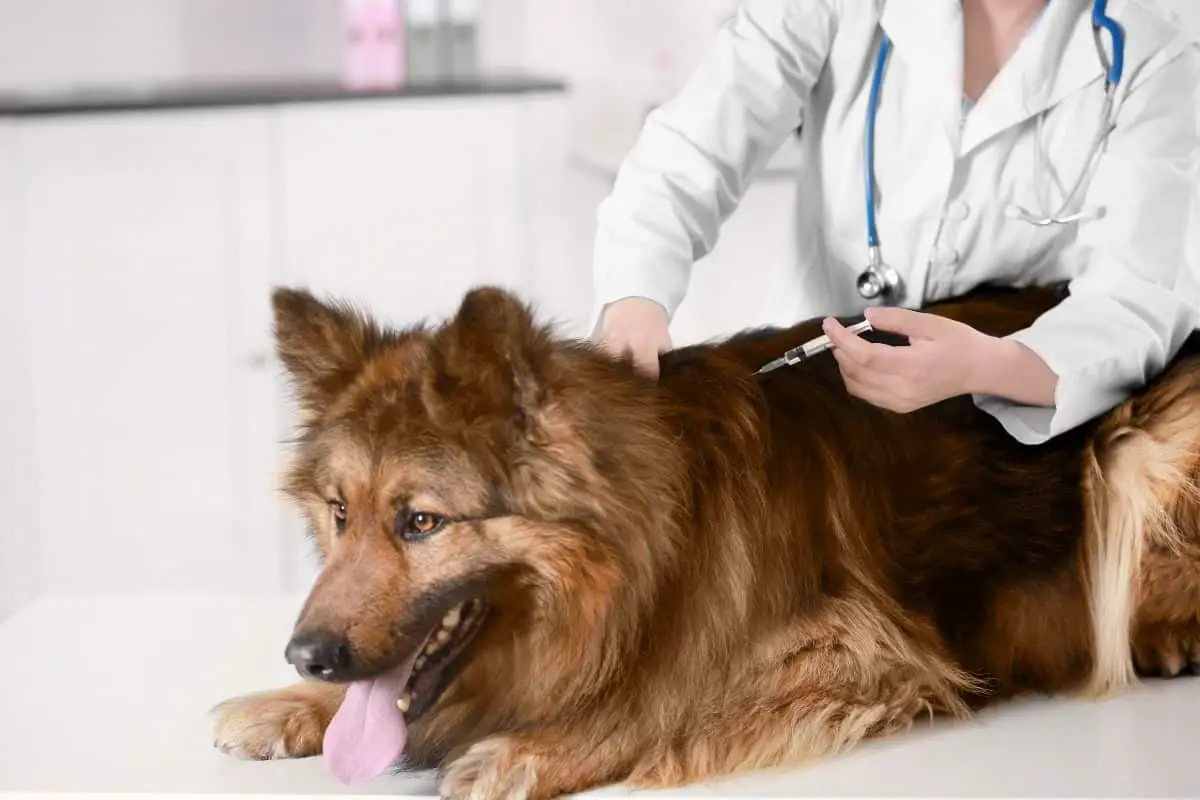We all want our dogs and puppies to live long, healthy lives. That includes all the lifestyle and healthy living activities that you would expect when looking after a pet. Taking them on regular walks.
Feeding them the right food. Giving them enough attention and stimulation.
Give them regular checkups with their vets. All these are important for your young puppy’s health so that they can have the best possible start in their lives.

This is why vaccinations are so important for young puppies. They help protect your dog from diseases that may be harmful to their health and life expectancy.
The most common vaccination for dogs is called the ‘7-way shot’ vaccine, which often prompts a lot of questions from first-time puppy owners.
How vital is it? What exactly does a 7-way vaccine jab include? When exactly should your dog or puppy receive this?
These questions are only natural for dog owners who are looking out for their beloved pets. Which is why we have created this helpful guide for your benefit.
This will answer all of those questions, plus more! We’ll also explain what exactly these shots do for your pup, and how they can benefit them. So let’s get started.
What Is A 7-Way Vaccine Jab?
Well, to put it simply, the 7-way vaccine shot protects against certain diseases that your puppy might not naturally be immune to or resistant to.
Whilst the various illnesses and conditions these viruses have on dogs might not always be fatal, they will almost always have long-term health consequences for your dog’s health, even if they do recover from them.
This is why vaccines are important for us as humans, and the same is true for dogs.
The 7-in-1-way jab isn’t quite how it sounds, however.
Rather than it being a single vaccination jab that contains 7 different vaccines, the 7-way jab is a series of vaccinations that are given at set intervals in your puppy’s early life, depending on the vet’s discretion, or the instructions on the vaccination if you are giving these to your dog yourself.
This is to give your pet’s immune system enough time to adapt and build up antibodies to protect your dog against these viral infections.
These vaccines have been designed specifically for dogs. It offers several different components, each one with unique purposes and benefits. These components work together as a whole to ensure that the immune system of your dog is protected from various illnesses.
What Vaccines Are In The 7-Way Jab?
So, now that we have explained what exactly the 7-way vaccine is and how it works, let’s take a closer look at what it’s for.
At this point, you’re likely going to be wondering what these vaccines are designed to protect your pet against.
Whilst the exact contents of a vaccine will usually vary a little, depending on the brand of the vaccine, these are the diseases and conditions that the 7-way jab protects your pet from:

Canine Distemper
One of the biggest risks to your dog’s health that they face is canine distemper. It is a virus that attacks your dog’s immune system, as well as its intestines and nervous systems. Without a vaccination, it is one of the most contagious viral infections out there for young dogs.
Dogs can catch this infection from other mammalian carnivore animals, such as wolves, coyotes, foxes, and even skunks or ferrets, as well as other dogs. It is usually spread through some kind of fluid contact.
This can happen in a variety of ways, from airborne exposure to it, such as through a dog’s sneeze or cough, to even a dog sharing a food or water bowl with another dog who carries the virus.
This virus first shows itself in your dogs with the appearance of discharge around your pet’s eyes.
After the first symptoms, it will quite quickly develop into more serious symptoms, such as diarrhea, lack of appetite, vomiting, excessive thirst, tremors, incoordination, difficulty breathing, seizures, and loss of consciousness.
Some dogs show no signs at all and remain completely unaffected by the disease, which makes them potential vectors of infections for many animals around them. As mentioned previously, though, it is very infectious.
If left untreated, it can cause severe complications such as paralysis, blindness, neurological damage, kidney failure, heart attack, and even death.
Even if your dog recovers from it, your dog will likely suffer from long-term health issues for the rest of its life, such as poor mobility, breathing issues, and severe nervous system damage. Therefore, your dog must get vaccinated against it.
Adenovirus
Adenovirus in dogs can manifest as both types 1 and 2 and can have varying levels of effects on your pet if they contract it. It is usually caught through the discharge in a dog or canine’s bodily fluids, such as through saliva, mucus, or urine.
As such, it can run rampant through dog shelters and kennels, where unvaccinated dogs may come into contact with some or all these things.
The viruses it causes when it affects your dog can vary based on its level of severity. There are mild cases of it that result in eye inflammation and conjunctivitis, while others are much worse than that. However, in either case, your dog will be affected by it in some capacity.
They may experience temporary fever, lethargy, anorexia (lack of appetite), and/or diarrhea. In the worst cases in young dogs, the virus will cause fluid buildup around the head and neck of the dog, and will typically cause the puppy to die.
As there are no specific treatments that are known to cure this condition, vaccination has proven to be the most effective way of combating this virus.
Parainfluenza
Parainfluenza is another respiratory viral infection that dogs can suffer from if not vaccinated against. These viruses can affect any individual dog but are especially dangerous to puppies under two months old.
The parainfluenza virus causes respiratory, gastrointestinal, and neurological problems in dogs.
If you see any signs like coughing or nasal discharge in your puppy, then it is best to bring him to his vet as soon as possible for treatment, even if there is very little they can do except help treat the secondary symptoms of this infection.
There is no cure for this virus, so prevention is the key here. Since parainfluenza spreads by contact with infected secretions, the best way to prevent it is to keep your pup away from sick pets.
Anyhow, make sure your puppy receives the required vaccinations before he enters a shelter, vet, or rescue center.
Canine Parvovirus
The third virus we’re discussing is canine parvovirus. This virus is caused when dogs’ intestines get irritated due to something else going wrong within your dog’s body, and is often a byproduct of the other illness we have discussed in this article.
What happens next is that the intestine becomes inflamed, which results in the release of large amounts of feces. Most often, these types of discharges occur at night, making it difficult for your dog to rest easily or safely.
In addition, dogs who have contracted the virus will also have a fever, loss of appetite, and other similar symptoms that are brought on by the virus.
If your dog has not been adequately vaccinated against this virus yet, then bringing them to a veterinarian immediately is the safest option for treating them.
They could receive antibiotics and anti-inflammatories to reduce the swelling in the abdomen that this disease causes.
Leptospira
There are four types of Leptospira that a 7-way jab is designed to protect your dog from, and all of them can have catastrophic effects on your puppy’s health.
Dogs that contract one of these infections usually don’t show any symptoms at first, only experiencing a slight fever after being exposed to infected animals. The symptoms will only continue to deteriorate your puppy’s quality of life once they have been infected, however.
Your puppy will start developing severe kidney failure, and it will become even more evident through their urine turning dark brown. Their eyesight will begin to deteriorate, and their heart rate will slow down drastically.
Because your puppy will likely have been infected for some time before you start to notice, your dog must be vaccinated before it has a chance to be infected in the first place.
When Should I Give My Dog Their 7-Way Vaccine Jab?
Most puppies will receive their first 7-way vaccine at 12 weeks old, or approximately 3 months old, followed by another shot at 16 weeks or 4 months old.
Vaccinations for puppies younger than this will usually not contain the leptospira part of the vaccine, so it is critical to make sure you keep track of what your puppy interacts within the weeks before they receive their vaccination, where they are at their most vulnerable in potentially contracting these illnesses.
Conclusion
So, as we have outlined, the consequences of not vaccinating your puppy and dogs are nothing to laugh at.
There are very serious risks involved if you choose not to give your puppy the proper vaccines needed to protect him from diseases that could potentially harm his health.
In general, if you do decide to go ahead with this decision, please look into finding out how much responsibility you might be taking on if your puppy contracts an illness later in life.
Not to mention, there are several ways that your puppy may contract each particular disease mentioned above, so you need to know exactly what methods he is susceptible to and ensure that he receives adequate protection.
- What Dog Breeds Have Pink Skin? - March 24, 2023
- What Are the Most Inspiring Dog Breeding Quotes? - March 20, 2023
- Can Pheromone Spray Help Improve Dog Breeding Results? - March 19, 2023








